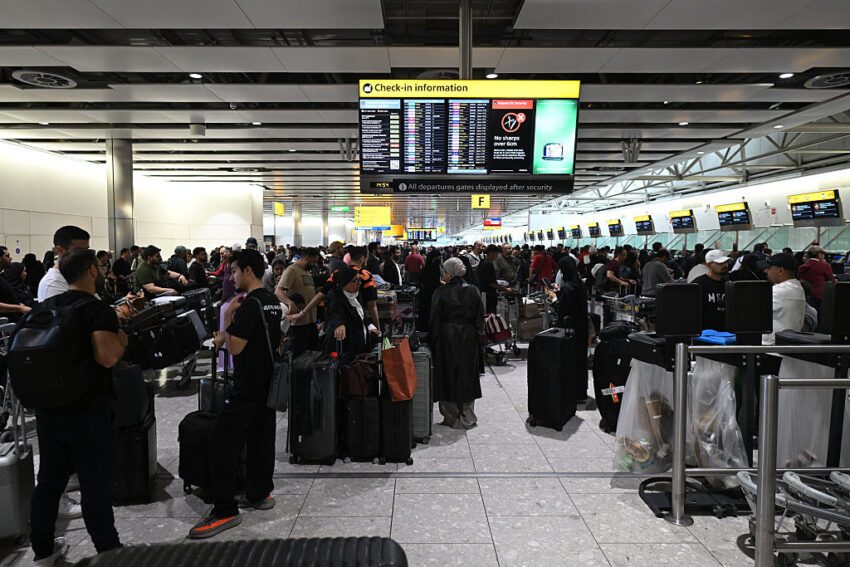
hundreds of flights delayed at heathrow and Major European airports, including Heathrow, Brussels, and Berlin, experienced significant flight delays over the weekend due to what Collins Aerospace has termed a “cyber-related incident.”
hundreds of flights delayed at heathrow and
Overview of the Incident
The disruption began on Saturday, September 20, 2025, affecting numerous flights across several major airports. Collins Aerospace, a key player in the aviation industry, reported that the incident was not a result of a direct attack on its systems but rather an issue that arose from a third-party service provider. This clarification has raised questions about the vulnerabilities inherent in interconnected systems within the aviation sector.
Extent of the Disruptions
Travelers at Heathrow, one of the busiest airports in the world, faced extensive delays, with reports indicating that hundreds of flights were either delayed or canceled. Similar disruptions were reported at Brussels Airport and Berlin Brandenburg Airport, where travelers experienced long wait times and confusion as airlines scrambled to manage the fallout.
Airlines including British Airways, Lufthansa, and Brussels Airlines were among those affected, leading to a ripple effect that extended to other airports across Europe. Many passengers took to social media to express their frustrations, sharing images of crowded terminals and long lines at check-in counters.
Response from Collins Aerospace
In a statement released shortly after the incident, Collins Aerospace emphasized that it was working closely with affected airlines and airports to resolve the issue. The company noted that it had activated its incident response team to assess the situation and mitigate the impact on operations.
“We are aware of the situation and are actively working to restore normal operations as quickly as possible,” the statement read. “We appreciate the patience of travelers during this time and are committed to ensuring their safety and security.”
Understanding the Cyber-Related Incident
While specific details about the nature of the cyber-related incident remain unclear, experts have pointed out that the aviation industry has increasingly become a target for cyberattacks. The interconnected nature of modern aviation systems means that vulnerabilities in one area can have cascading effects across multiple platforms and services.
Cybersecurity experts have warned that as airports and airlines continue to adopt more digital technologies, the potential for cyber incidents increases. This incident serves as a stark reminder of the importance of robust cybersecurity measures and the need for constant vigilance in protecting sensitive systems.
Impact on Travelers
The immediate impact of the delays was felt by thousands of travelers who were left stranded or forced to change their travel plans. Many passengers reported being informed of their flight status only at the last minute, leading to confusion and frustration.
For those traveling for leisure, the delays meant missed connections and disrupted itineraries. Business travelers faced similar challenges, as important meetings and engagements were jeopardized due to the unforeseen circumstances.
Airline and Airport Responses
Airlines and airports implemented various measures to assist affected passengers. British Airways, for example, offered rebooking options and accommodations for those whose flights were canceled. Similarly, Brussels Airlines provided updates through its social media channels, keeping travelers informed about the status of their flights.
Airports also increased staffing levels to manage the influx of inquiries from concerned travelers. Information desks were set up to provide assistance, and airport personnel worked diligently to communicate updates as they became available.
Broader Implications for the Aviation Industry
This incident raises significant questions about the resilience of the aviation industry in the face of cyber threats. As airlines and airports increasingly rely on digital systems for operations, the potential for disruptions due to cyber incidents becomes a pressing concern.
Industry experts emphasize the need for a comprehensive approach to cybersecurity that includes regular assessments, employee training, and collaboration between stakeholders. The interconnected nature of the aviation ecosystem means that a breach in one area can have far-reaching consequences.
Stakeholder Reactions
Reactions from various stakeholders have been mixed. Industry analysts have called for a reevaluation of cybersecurity protocols within the aviation sector. “This incident highlights the vulnerabilities that exist in our current systems,” said an aviation security analyst. “It’s crucial that we take proactive measures to safeguard against future threats.”
Passengers have expressed their concerns as well, with many calling for greater transparency from airlines and airports regarding their cybersecurity measures. “As a frequent traveler, it’s alarming to think that our safety could be compromised by a cyber incident,” one traveler commented. “Airlines need to do more to protect us.”
Future Considerations
Looking ahead, the aviation industry must prioritize cybersecurity as a fundamental aspect of its operations. This incident serves as a wake-up call for stakeholders to invest in advanced security measures and technologies that can help mitigate risks associated with cyber threats.
Collaboration between airlines, airports, and cybersecurity firms will be essential in developing a robust defense against potential attacks. Regular training and awareness programs for employees can also play a crucial role in enhancing overall security posture.
Conclusion
The recent cyber-related incident that led to widespread flight delays at major European airports underscores the vulnerabilities faced by the aviation industry in an increasingly digital world. As airlines and airports work to recover from the disruption, the focus must shift toward strengthening cybersecurity measures to safeguard against future incidents.
Travelers, airlines, and industry stakeholders alike must remain vigilant and proactive in addressing the challenges posed by cyber threats. The lessons learned from this incident will be vital in shaping a more secure and resilient aviation landscape moving forward.
Source: Original report
Was this helpful?
Last Modified: September 21, 2025 at 8:36 pm
1 views















